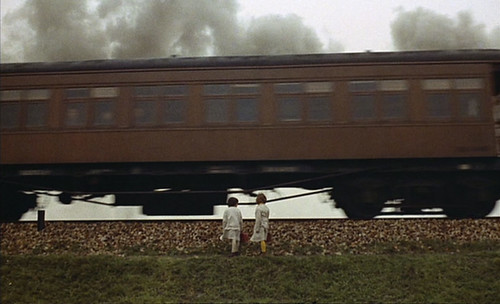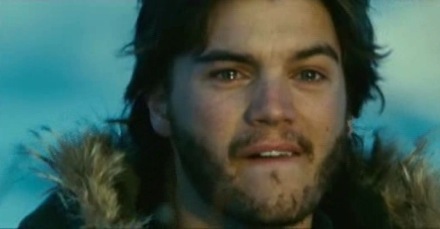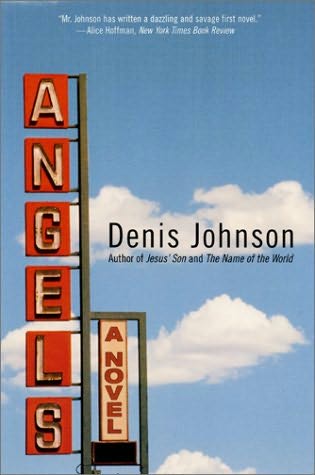
I first heard of
The Spirit of the Beehive while researching
a piece about my favorite performances by child actors. I discovered it too late to include it, and I just got around to renting it -- well, in March, since which time it had been sitting around in a Netflix envelope. (I've recently gotten better about it, but for a few months there Netflix was a pretty boneheaded investment on my part.)
Directed by Victor Erice and released in 1973, the movie is set in the Spanish countryside in 1940, just after the end of the civil war that established the dictatorship of General Franco (who would die two years after the movie was made). It popped up during my research because of Ana Torrent (left, above), who plays six-year-old Ana. The plot revolves around Ana’s state of mind after she and her older sister Isabel (Isabel Tellería) attend a local screening of
Frankenstein. (The horror movie arrives by way of a traveling cinema company, and it's shown on a wall in one of the small town's many deteriorating stone buildings.)
The story, though affecting and well told, is spare and might not have been enough to carry a less brilliantly composed movie. What's most remarkable about
Beehive is its visual beauty. The cast is terrific, the sound is well designed, and the evocation of both the boredom and imagination of childhood is acute, but it's the cinematography that allows all of those successes to stay with you.
Framed like a series of timeless photographs, and filled with what
one critic called "a clear, wintry light,"
Beehive’s cinematography was handled by Luís Cuadrado, who was suffering at the time from an encroaching blindness that eventually ended his career.
Cuadrado regularly sets the small girls against the enormity of their environment:



Somewhere in those vast expanses, the sisters come upon an abandoned farm building, where they waste a few hours. Visiting the spot alone one day, Ana finds a wounded soldier using the space as a hideout. Her discovery of him mirrors the little girl's discovery of the monster in
Frankenstein. Already obsessed with the idea of death and spirits from having seen the movie, Ana is eventually traumatized by her experiences.
I would knock the way we live now and say that
Beehive is visually precise and sumptuous in a way that movies rarely even attempt anymore, but I’m not sure they’ve
ever regularly strived for this kind of sustained beauty.
But while it can be appreciated on a purely visual level by anyone who doesn't mind quiet and stillness (the script is very good, but the story is mostly told through images), knowing the background helps deepen its power. Paul Julian Smith elucidates the context in
an essay for The Criterion Collection:
Like many repressive regimes, Francoism attempted to use cinema to change its negative image abroad and to create the impression that freedom of expression was permitted. By producing some internationally successful "quality" films, the regime also hoped to raise the status of Spanish cinema generally, which was at that time dominated by crude, mainstream comedies. By the early seventies, these policies had led to the production and export of many experimental and even discreetly oppositional films, although, of course, no overtly leftist movies could be made. The gaping holes in the plot of The Spirit of the Beehive and the mysterious motivations of its characters are typical of this "Francoist aesthetic," a term used to describe artistically ambitious movies of the time that made use of fantasy and allegory. These characteristics, which remain so magical to modern audiences, were used in the period as a form of indirect critique. ...
The question of how political The Spirit of the Beehive is has been hotly debated since the film's premiere, when leftist critics attacked its lack of overt commentary. Yet to equate Franco and Frankenstein as twin masters of horror is too crude. By focusing not on national conflict but on domestic distress, what one reviewer called "the war behind the window," Erice gives a much more subtle and moving take on the historical trauma suffered by Spain in the twentieth century.
You may have already guessed that the movie has quite a bit in common with last year's
Pan's Labyrinth, Guillermo Del Toro's fantasy-horror story set in rural Spain in 1944. As
J. Hoberman wrote of the two movies in
The Village Voice:
Although utterly different types of filmmaking, each of these is the story of a brave little girl lost in a world of make-believe—at once an intuitive anti-fascist and the innocent victim of a monstrous system.
I don't know if they're "utterly" different, since they not only share a historical setting, but a similarly intended use of allegory and an attention to visual detail. Del Toro was asked if his film was inspired by
Beehive, and
he said this:
It could be. Not consciously. I nevertheless must admit that Spirit of the Beehive is one of those seminal movies that seeped into my very soul.
He has
also said:
I think that in The Spirit of the Beehive, what is beautiful about it, is that it's sedate, the tone of it is much more sedate. Mine is furiously symbolistic, if you want. (Beehive) is sort of everyday life and then there is only one fantastic element echoing at the end of the movie. Such brilliance. Mine is you know, far more baroque.
His is also a lot more graphic and menacing, which almost sent me
scurrying from the theater even as I marveled at the overall accomplishment.
Both movies are well worth seeing, and they offer an opportunity for comparison that's hard to refuse. But I meant to write about
Beehive on its own merits. It's one of a handful of the best sensory experiences I've had with movies, and it's lingered strongly in the few weeks since I watched it.


















